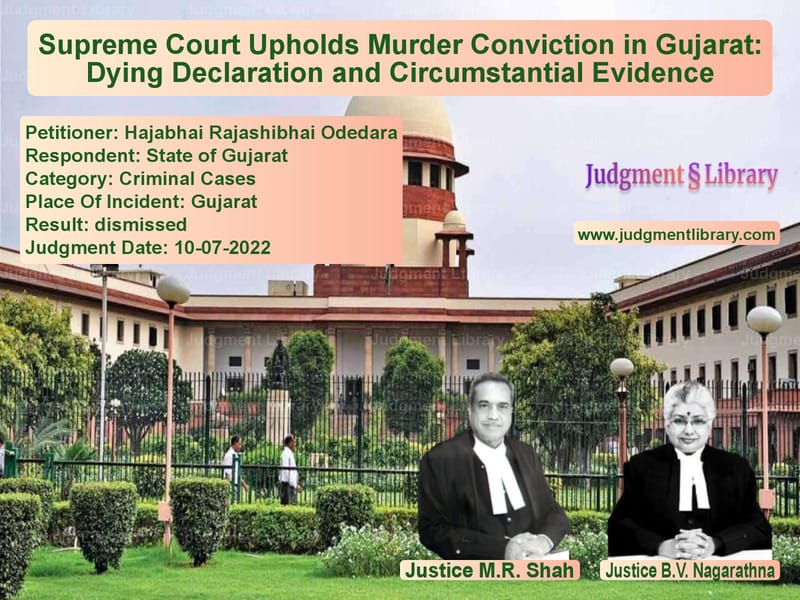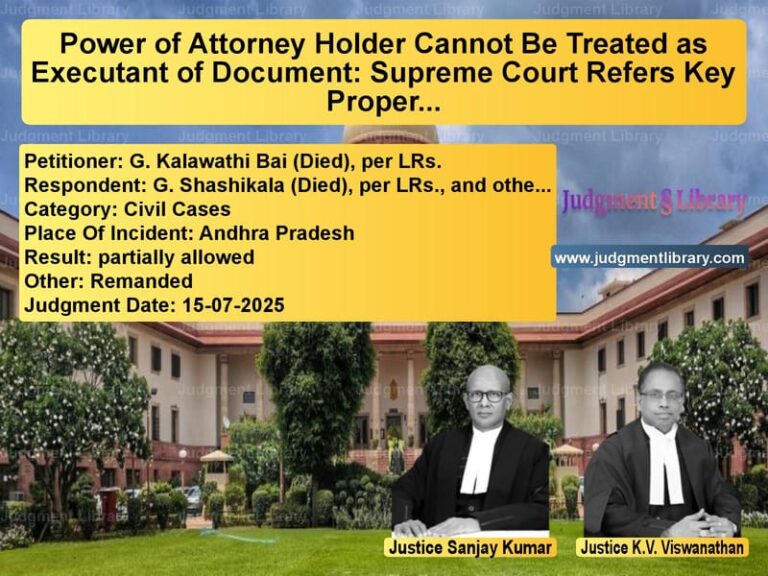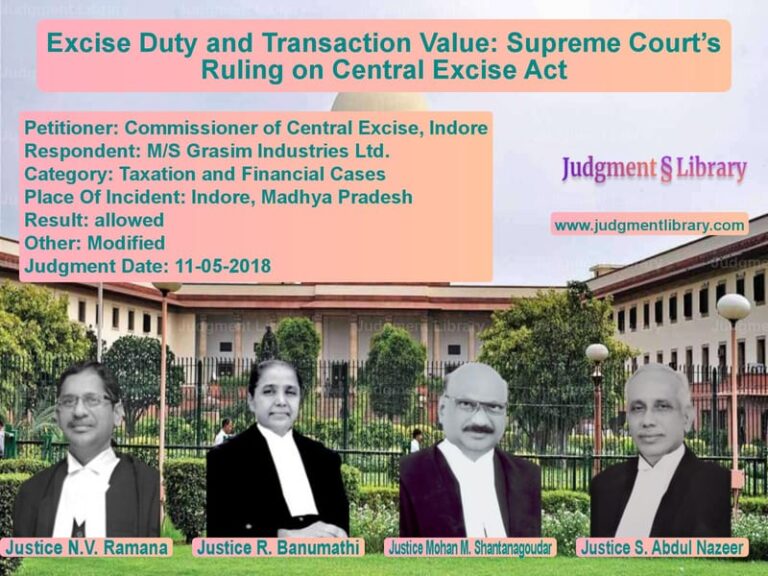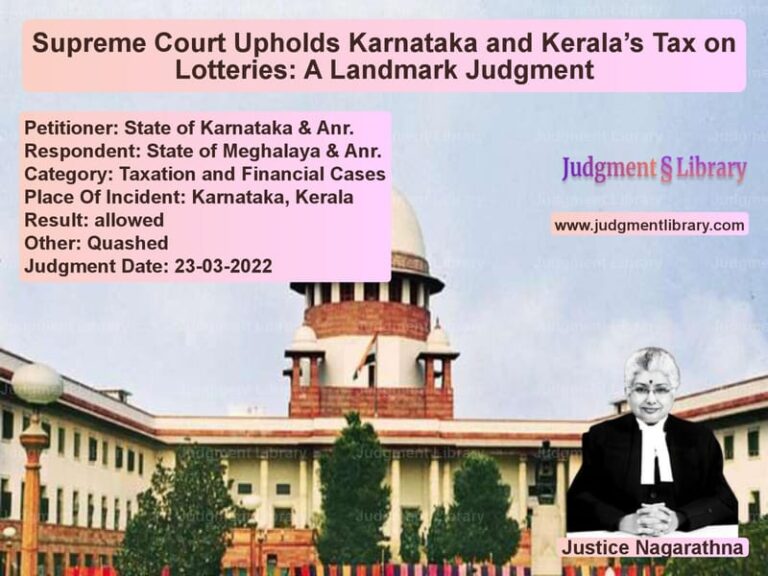Supreme Court Upholds Murder Conviction in Gujarat: Dying Declaration and Circumstantial Evidence
The case of Hajabhai Rajashibhai Odedara vs. State of Gujarat is a significant ruling that reaffirms the importance of dying declarations and circumstantial evidence in securing convictions under the Indian Penal Code (IPC). The Supreme Court was called upon to decide whether the conviction of the accused, based primarily on the deposition of the survivor and forensic evidence, should be upheld. The case involves a double murder and an attempted murder in Gujarat, where the accused allegedly conspired with his lover to eliminate her family members.
Background of the Case
The case originated from an incident that took place in Gujarat, where the appellant, Hajabhai Rajashibhai Odedara, was accused of conspiring with his lover, Jagrutiben, to murder her family members. According to the prosecution:
- The accused and Jagrutiben planned to kill her family so that they could be together.
- They strangled Jagrutiben’s mother, Simbhiben, and her brother, Mukesh, leading to their deaths.
- The accused attempted to murder another family member, Rajdeep (PW66), who survived and later provided crucial testimony.
The prosecution heavily relied on the dying declaration of Rajdeep, medical reports confirming the cause of death as asphyxia due to strangulation, and circumstantial evidence linking the accused to the crime scene.
Trial Court Conviction
The Trial Court convicted the accused under Sections 302 (murder), 307 (attempt to murder), and 328 (causing harm by poison) of the IPC. The key factors in the conviction were:
- The deposition of Rajdeep (PW66), who survived the attack.
- The presence of the accused at the crime scene.
- The forensic evidence, including the recovery of a pesticide bottle purchased by the accused.
The Trial Court sentenced the accused to life imprisonment with a fine of Rs. 50,000 for the offense under Section 302 IPC, life imprisonment with a fine of Rs. 25,000 for the offense under Section 307 IPC, and five years of rigorous imprisonment with a fine of Rs. 25,000 for the offense under Section 328 IPC.
High Court Appeal
The accused challenged the Trial Court’s judgment before the Gujarat High Court, arguing that:
- The conviction was based solely on the deposition of Rajdeep, which was inconsistent.
- The prosecution failed to establish a clear motive.
- The reliance on circumstantial evidence was flawed as there was no direct witness.
- The medical report showed strangulation but did not conclusively link the accused.
- The pesticide bottle found at the crime scene could not be directly attributed to the accused.
The High Court dismissed the appeal and upheld the Trial Court’s decision, stating that the prosecution had successfully established the guilt of the accused beyond a reasonable doubt.
Supreme Court Proceedings
The accused then approached the Supreme Court, raising the same contentions. The defense argued that:
- Rajdeep’s statements were inconsistent, as he provided multiple accounts of the incident.
- There was no forensic evidence linking the accused to the crime scene.
- The motive behind the crime was not clearly established.
- Several witnesses had turned hostile, weakening the prosecution’s case.
Arguments by the Respondent (State of Gujarat)
The State of Gujarat, represented by the prosecution, countered these arguments:
- Rajdeep’s (PW66) testimony remained largely consistent and credible despite minor inconsistencies.
- The accused was last seen at the crime scene, and circumstantial evidence strongly suggested his involvement.
- The medical report confirmed that the victims died due to asphyxia by strangulation, supporting the prosecution’s case.
- The recovery of a pesticide bottle purchased by the accused further established his role in the crime.
- The surviving witness provided corroborative testimony that linked the accused directly to the crime.
Supreme Court’s Observations
The Supreme Court, comprising Justices M.R. Shah and B.V. Nagarathna, reviewed the evidence and made the following observations:
- Despite variations in Rajdeep’s statements, his deposition was largely consistent and supported by forensic evidence.
- The presence of the accused at the crime scene was well-documented and confirmed by multiple witnesses.
- The forensic recovery of a pesticide bottle linked to the accused further reinforced his involvement.
- The injuries on Rajdeep were medically verified, proving an attempt to murder.
- The accused failed to provide a satisfactory explanation for the circumstantial evidence against him.
Final Judgment
The Supreme Court upheld the conviction and stated:
“The prosecution has successfully established the chain of events leading to the guilt of the accused beyond a reasonable doubt. The trial court and the High Court have correctly appreciated the evidence on record, and there is no reason to interfere with the findings.”
The Court dismissed the appeal and reaffirmed the sentence imposed by the lower courts.
Key Takeaways
- Dying declarations hold significant evidentiary value if corroborated by medical and forensic evidence.
- Circumstantial evidence can play a decisive role in securing a conviction if it forms a complete chain.
- Judicial scrutiny of witness credibility ensures that unreliable testimonies do not lead to wrongful convictions.
- Forensic evidence and last-seen theory strengthen the prosecution’s case.
- Role of motive in criminal trials: While motive strengthens a case, its absence does not necessarily result in acquittal if other evidence is strong.
Conclusion
The judgment in Hajabhai Rajashibhai Odedara vs. State of Gujarat reinforces the importance of dying declarations, forensic evidence, and circumstantial proof in criminal trials. The Supreme Court’s decision ensures that justice is served by relying on a thorough examination of evidence and witness credibility. This case sets a precedent for handling complex murder trials where direct evidence is limited but circumstantial and forensic evidence play a crucial role.
Petitioner Name: Hajabhai Rajashibhai Odedara.Respondent Name: State of Gujarat.Judgment By: Justice M.R. Shah, Justice B.V. Nagarathna.Place Of Incident: Gujarat.Judgment Date: 10-07-2022.
Don’t miss out on the full details! Download the complete judgment in PDF format below and gain valuable insights instantly!
Download Judgment: hajabhai-rajashibhai-vs-state-of-gujarat-supreme-court-of-india-judgment-dated-10-07-2022.pdf
Directly Download Judgment: Directly download this Judgment
See all petitions in Murder Cases
See all petitions in Bail and Anticipatory Bail
See all petitions in Legal Malpractice
See all petitions in Other Cases
See all petitions in Judgment by Mukeshkumar Rasikbhai Shah
See all petitions in Judgment by B.V. Nagarathna
See all petitions in dismissed
See all petitions in supreme court of India judgments July 2022
See all petitions in 2022 judgments
See all posts in Criminal Cases Category
See all allowed petitions in Criminal Cases Category
See all Dismissed petitions in Criminal Cases Category
See all partially allowed petitions in Criminal Cases Category







